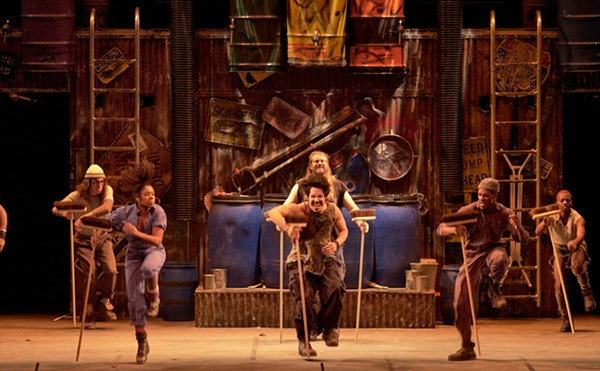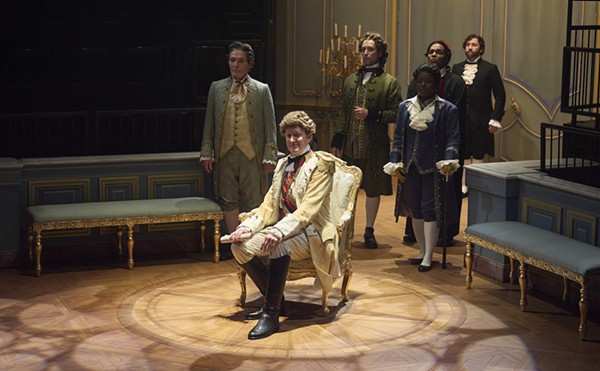If you enjoy plays about a dream come true, here it is. Back in 1925, a 37-year-old Kentuckian named Floyd Collins decided to find a new entrance to the many caves that riddle the area where he was from. He wanted to create a tourist attraction and become famous. Well, that all happened. But not quite as he had envisioned it.
In Floyd Collins, a musical composed by the fiendishly innovative Adam Guettel, who also wrote the lyrics, we see how Floyd's dream went tragically down the tubes, almost from the start. On an exploration down a small, barely perceptible hole in the ground, he eventually comes upon a large underground grotto. But on his way back out, his leg is trapped by a boulder and he's stuck in the dark.
By the next day, his friends and family members have found him (apparently they're quite accustomed to looking below ground for this cave enthusiast), and they think they'll get him out in a jiffy. But after another subterranean rockslide, sealing off the tiny entranceway, Floyd's fate is looking darker than the inside of a raccoon's butthole.
As the story plays out in the book written by Tina Landau, we see Floyd's brother Homer, his sister Nellie, and a flock of other local yokels who gather around the site feeling helpless. This tale labors to get going in the first act for several reasons. Floyd's opening two solos, establishing his love for and bonding with the cave, are weakened due to an amplification system that seemed dialed up to 11. As a result, the words sung by a game Michael Snider came out loud and fuzzy — a result we will assume was not intended.
Before we go on, a note about the composer's music. It is nothing like you would expect from, say, musical theater icon Richard Rodgers, who happens to be the grandfather of Guettel. By employing unexpected and sometimes atonal musical fillips and surprising rhythms, Guettel fashions songs with a bluegrass feel that often feel jarring and ragged. Trouble is, this is a contemporary musical technique that often veers away from the time and location of this event. The cast of singers and the conductor Matthew Dolan are to be praised for attempting such a challenging task. But how satisfying the end result is will depend on your acceptance of this style of quirky music.
After a first act full of rather depressing events, Act 2 begins with a rousing "Is That Remarkable?" This song, performed enthusiastically by three reporters (Robert Pierce, Brian O. Jackson and David L. Munnell) displays witty lyrics as the play satirizes the bloodthirsty types in the press corps that have been attracted to the looming tragedy-in-progress. And it's not just the reporters who are craven. As the screens above the stage show, there are photos from the time showing tourists gawking and pop-up vendors selling trinkets and trash.
The second act features a couple more melodic tunes, including "Through the Mountain," sung with quiet intensity by Madeline Krucek as Nellie. And a duet/fantasy sequence with Floyd and Homer (Michael Knobloch), "The Dream," has effective moments. However, Knobloch never takes enough chances to register powerfully as Homer, especially when an out-of-town filmmaker visits the scene and, unaccountably, sees Hollywood leading man star power in Floyd's baby brother.
A number of smaller characters make a stronger impression. Jeff Glover mumbles amusingly as farm owner Bee Doyle, and Pat Miller stands out as "Skeets" Miller, a physically slight newspaper reporter who actually crawls into the cave and interviews Floyd in situ (the real Skeets won a Pulitzer for his efforts). Amiee Collier and Rob Albrecht work well together as Miss Jane and Lee Collins. And as the older neighbor Ed Bishop and young Jewell Estes, John J. Polk and Joseph Daso show how folks of all ages were involved in this event. However Daniel Bush as a blowhard contractor/volunteer over-torques his delivery.
In the title role, Snider exudes a plucky, indomitable spirit as he lays prone and wedged under a center platform for most of the show. But we never connect fully with his character's obsession with caves, which should become evocative as he croons into the underground voids and listens for the overlapping echoes.
Director and set designer Patrick Ciamacco once again manages to stage a large-cast production in the cozy confines of BCT, and it's always clear which characters are above ground and which are somewhere under the turf. One just wishes that the sound levels were managed more deftly, so that Guettel's defiantly uncompromising music could get the best hearing possible.
Without a firm sense of Floyd's adoration of the cave world and all its mysteries, we aren't able to fully appreciate his ironic predicament. As "The Ballad of Floyd Collins" says, with admirable brevity: "He went looking for his fortune underground/Sure enough, his fortune is what he found."













